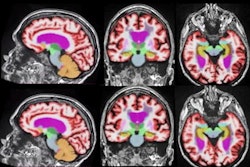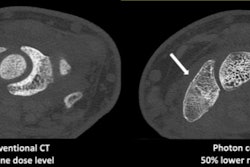Dear AuntMinnie Member,
PET/CT with a radiotracer based on gallium-68 (Ga-68) proved to be more precise than MRI for detecting meningiomas in patients scheduled for radiation therapy, according to the top story on AuntMinnie.com for the past week.
Researchers from the University of Ohio tested a Ga-68 DOTATATE PET/CT radiotracer against contrast-enhanced MRI for treatment planning of meningioma patients. Clinicians reported that they were able to identify additional areas of disease with PET/CT.
In other molecular imaging news, a group of Canadian researchers developed a new model using PET for diagnosing the severity of Alzheimer's disease. They took topographical data from tau PET scans and applied it to an anatomical framework called Braak staging. Visit our Molecular Imaging Community to find out how well it worked.
Ultrasound of lymphadenopathy
It's become known that lymphadenopathy -- or swollen lymph nodes -- can be a side effect of vaccination for COVID-19. This can confound breast screening exams if clinicians aren't aware of the phenomenon.
In fact, researchers from South Korea found in a new study that lymphadenopathy persisted on ultrasound scans up to 12 weeks after vaccination. They believe their findings can help radiologists decide how to manage patients undergoing breast screening.
Get more stories like this in our Ultrasound Community.
PACSman pontificates
The market for artificial intelligence (AI) is red hot, but is it real? That's the question posed by the PACSman -- consultant Michael J. Cannavo -- in his latest PACSman Pontificates column.
Mike poses the question of whether AI software will show a financial return in the near future, noting the massive amounts of venture capital that's pouring into the segment. He also notes that the limitations of AI are beginning to become clearer.
Learn more in Mike's column in our Artificial Intelligence Community.



















